详解过去进行时及练习题
英语过去完成进行时练习题20篇及解析

英语过去完成进行时练习题20篇及解析一、单项选择过去完成进行时1.He _______ English for four years before he went abroad.A.has studied B.was studyingC.has been studying D.had been studying【答案】D【解析】试题分析:考查时态。
根据句意:在他出国之前已经学习了四年的英语。
可知,学英语的动作发生在出国之前,而且现在出国依然在学,因此用过去完成进行时。
所以答案选D。
考点:考查时态2.I was suffering from a headache. That was probably because I ________in front of the computer too long.A.worked B.was workingC.have been working D.had been working【答案】D【解析】【详解】考查时态。
句意:我头疼。
可能是因为我在电脑前工作的太久了。
“工作”这个动作在我“头疼”之前一直在进行,所以用过去完成进行时,故选D。
3.—Why did they go to bed that early that night?—They were tired. They the walls all day long.A.were painting B.have paintedC.would paint D.had been painting【答案】D【解析】【详解】考查时态。
句意:——为什么那天晚上那么早,他们就上床睡觉了。
——他们累了,他们刷墙刷了一整天。
根据句意可知,睡觉这一动作发生在过去,且刷墙发生在"睡觉"之前,即过去的过去;又因为"刷墙"是在过去的过去一直进行的动作,因此用过去完成进行时,故选D。
4.Not only five gold medals in a row, but they also have not lost a single game since the 1992 Olympics.A.has the team won B.the team has wonC.did the team win D.the team won【答案】A【解析】【详解】考查部分倒装及谓语动词的时态。
过去进行时知识点梳理及经典练习(超详细)

过去进行时知识点梳理及经典练习(超详细)一、初中英语过去进行时1.—Did you watch the football match on TV last night? —I wanted to, but my mother her favorite TV programme.A. watchesB. watchedC. was watchingD. had watched【答案】 C【解析】【分析】句意:一昨晚你在电视上看足球比赛了吗?一我想看,但我的母亲在看她最喜欢的电视节目。
A.第三人称单数形式;B.过去式或过去分词;C.过去进行时形式;D.过去完成时形式。
根据语境,所以选C。
2.Students in Grade Nine ____________a maths exam at this time yesterday.A. takeB. are takingC. were takingD. have taken【答案】 C【解析】【分析】句意:昨天的这个时候,九年级的学生正在参加数学考试。
根据at this time yesterday. 可知这是一个过去的具体的时刻,过去的具体时刻出现的句子应使用过去进行时,C是过去进行时,故答案是C。
【点评】考查过去进行时,注意at this time加过去的时间范围用于过去进行时。
3.—What were you doing at this time yesterday?—I ________on the grass and drawing a picture.A. sitB. satC. am sittingD. was sitting【答案】 D【解析】【分析】句意:—昨天这个时候你在做什么?—我正坐在草地上画画。
问句用过去进行时,所以答语也应用过去进行时,was sitting。
故选D。
【点评】考查过去进行时的用法。
注意根据时间状语和上下文来确定句子的时态。
英语过去进行时题20套(带答案)及解析
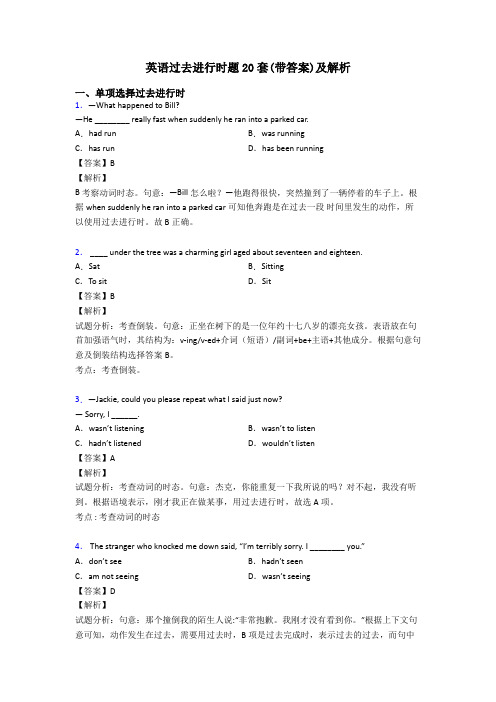
英语过去进行时题20套(带答案)及解析一、单项选择过去进行时1.—What happened to Bill?—He ________ really fast when suddenly he ran into a parked car.A.had run B.was runningC.has run D.has been running【答案】B【解析】B 考察动词时态。
句意:—Bill怎么啦?—他跑得很快,突然撞到了一辆停着的车子上。
根据when suddenly he ran into a parked car可知他奔跑是在过去一段时间里发生的动作,所以使用过去进行时。
故B正确。
2. ____ under the tree was a charming girl aged about seventeen and eighteen.A.Sat B.SittingC.To sit D.Sit【答案】B【解析】试题分析:考查倒装。
句意:正坐在树下的是一位年约十七八岁的漂亮女孩。
表语放在句首加强语气时,其结构为:v-ing/v-ed+介词(短语)/副词+be+主语+其他成分。
根据句意句意及倒装结构选择答案B。
考点:考查倒装。
3.—Jackie, could you please repeat what I said just now?— Sorry, I ______.A.wasn’t listening B.wasn’t to listenC.hadn’t listened D.wouldn’t listen【答案】A【解析】试题分析:考查动词的时态。
句意:杰克,你能重复一下我所说的吗?对不起,我没有听到。
根据语境表示,刚才我正在做某事,用过去进行时,故选A项。
考点 : 考查动词的时态4.The stranger who knocked me down said, “I’m terribly sorry. I ________ you.”A.don’t see B.hadn’t seenC.am not seeing D.wasn’t seeing【答案】D【解析】试题分析:句意:那个撞倒我的陌生人说:“非常抱歉。
英语中过去进行时的总结与练习题

英语中过去进行时的总结与练习题一、过去进行时的总结过去进行时是一种表示过去某个时间点或某个时间段内正在进行的动作的时态。
它常常与表示过去的时间状语连用,如“yesterday”, “last night”, “at that time”等。
过去进行时的基本结构是“was/were + 现在分词”。
1. 用途与功能•描述过去某个时刻正在进行的动作或状态。
•与过去某个时刻的短暂动作或状态进行对比。
•与一般过去时连用,表示两个过去动作同时发生。
2. 构成方式•主语为第三人称单数时,使用“was + 现在分词”。
•主语为其他形式时,使用“were + 现在分词”。
3. 与其他时态的区别•与一般过去时相比,过去进行时强调动作在过去的某个时间点或时间段内正在进行,而一般过去时则强调动作的完成或结束。
•与现在进行时相比,过去进行时描述的是过去的情景,而现在进行时描述的是现在的情景。
4. 常见的时间状语•at that time•at noon•at midnight•this morning/afternoon/evening•yesterday•last night•when, while引导的时间状语从句二、练习题选择题1.When I ______ my homework, my sister ______ TV.A. did; watchedB. was doing; was watchingC. was doing; watchedD. did; was watching2.They ______ a football match from 7 to 9 last night.A. watchedB. are watchingC. were watchingD. watch3.What ______ you ______ at 8 o’clock last night?A. did; doB. were; doingC. are; doingD. do; do4.It was raining hard. They ______ just ______ their umbrellas.A. had; leftB. have; leftC. had; been leavingD. were; leaving5.We ______ a film at 8 last night when the power cut off.A. watchedB. are watchingC. were watchingD. had watched填空题1.I ______ (cook) dinner when the phone rang.st night, they ______ (play) cards when I ______ (arrive) home.3.While the teacher ______ (explain) the text, the students ______ (take) notes.4.We ______ (have) a meeting from 2 to 4 yesterday afternoon.5.When I ______ (get) to the station, the train ______ (leave).翻译题1.昨天晚上8点,我正在做作业,而我的弟弟正在看电视。
(英语) 英语过去进行时专题练习(及答案)含解析
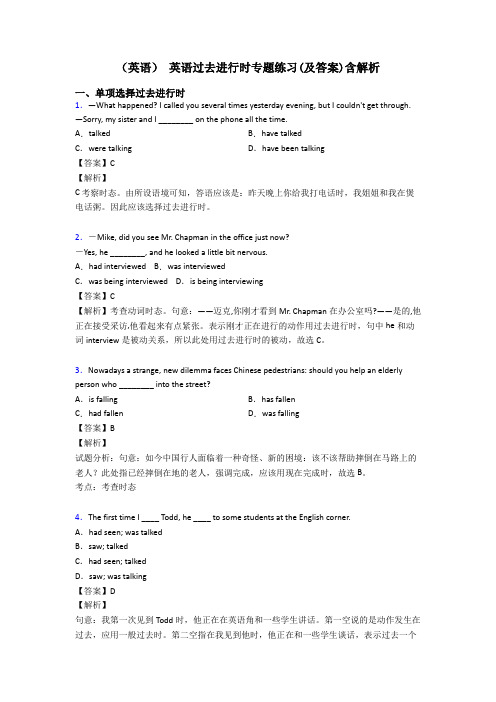
— Sorry, I ___________. Would you please say it again?
A.hadn’t listenedB.wouldn’t listen
C.wasn’t listeningD.won’t listen
A.had seen; was talked
B.saw; talked
C.had seen; talked
D.saw; was talking
【答案】D
【解析】
句意:我第一次见到Todd时,他正在在英语角和一些学生讲话。第一空说的是动作发生在过去,应用一般过去时。第二空指在我见到他时,他正在和一些学生谈话,表示过去一个时间点或时间段正在进行的动作或状态应用过去进行时。故判断选D。
--- I am sorry. But Ito catch the coming bus.
A.tryB.triedC.am tryingD.was trying
【答案】D
【解析】
试题分析:考查情景交际和时态。句意:--噢!你撞到我了!--对不起。我(刚才)正在赶公交车。根据情景可知,是刚才发生的事情,应该用过去的某种时态,强调过去某一时刻发生的事情,用过去进行时,故选D。
18.—What a pity that Dad didn’t attend my graduation ceremony yesterday afternoon.
—Oh, he _______ some business partners from Europe.
A.would meetB.was meeting
(英语) 英语过去进行时专题练习(及答案)含解析
英语过去进行时练习题及答案及解析

英语过去进行时练习题及答案及解析一、单项选择过去进行时1.--- Oh! You bumped me!--- I am sorry. But I to catch the coming bus.A.try B.tried C.am trying D.was trying【答案】D【解析】试题分析:考查情景交际和时态。
句意:--噢!你撞到我了!--对不起。
我(刚才)正在赶公交车。
根据情景可知,是刚才发生的事情,应该用过去的某种时态,强调过去某一时刻发生的事情,用过去进行时,故选D。
考点:考查情景交际和时态2.–What did you say?--So you _____________ to me.A.won’t listen B.didn’t listen C.haven’t listened D.weren’t listening 【答案】D【解析】考查时态。
根据上下文可知是指刚才你没有在听我说话。
句意:—你说什么?—那么你刚才没有在听我说话!3.The fans _____the names of the band members when they appeared at the airport. A.had screamed out B.were screaming outC.would scream out D.have screamed out【答案】B【解析】试题分析:考查时态。
句意:当他们接近机场的时候,歌迷们一直在尖叫着乐队成名的名字。
根据句意可知在过去某个时间点上正在进行的动作,所以使用过去进行时。
故B正确。
考点:考查时态4.Would you please repeat what the man said? I ________.A.won’t listen B.wasn’t listeningC.haven’t listened D.hadn’t listened【答案】B【解析】试题分析:句意:你可以重复一下那个人说的话吗?我刚才没听。
过去进行时讲解及练习
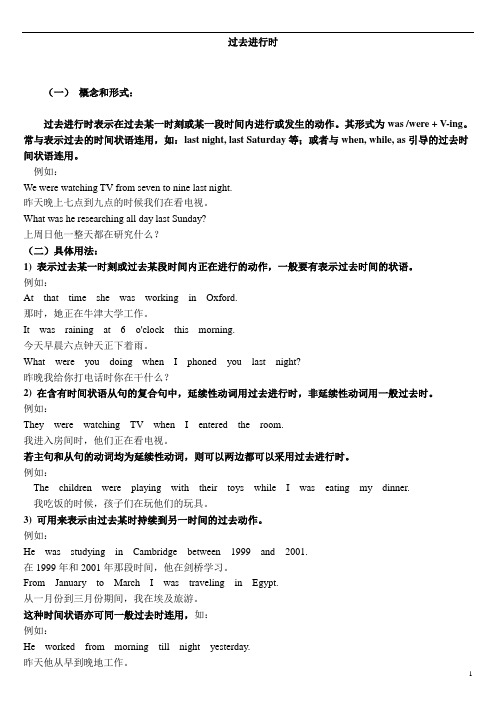
过去进行时(一)概念和形式:过去进行时表示在过去某一时刻或某一段时间内进行或发生的动作。
其形式为was /were + V-ing。
常与表示过去的时间状语连用,如:last night, last Saturday等;或者与when, while, as引导的过去时间状语连用。
例如:We were watching TV from seven to nine last night.昨天晚上七点到九点的时候我们在看电视。
What was he researching all day last Sunday?上周日他一整天都在研究什么?(二)具体用法:1) 表示过去某一时刻或过去某段时间内正在进行的动作,一般要有表示过去时间的状语。
例如:At that time she was working in Oxford.那时,她正在牛津大学工作。
It was raining at6o'clock this morning.今天早晨六点钟天正下着雨。
What were you doing when I phoned you last night?昨晚我给你打电话时你在干什么?2) 在含有时间状语从句的复合句中,延续性动词用过去进行时,非延续性动词用一般过去时。
例如:They were watching TV when I entered the room.我进入房间时,他们正在看电视。
若主句和从句的动词均为延续性动词,则可以两边都可以采用过去进行时。
例如:The children were playing with their toys while I was eating my dinner.我吃饭的时候,孩子们在玩他们的玩具。
3) 可用来表示由过去某时持续到另一时间的过去动作。
例如:He was studying in Cambridge between1999and2001.在1999年和2001年那段时间,他在剑桥学习。
英语过去进行时练习题20篇及解析

英语过去进行时练习题20篇及解析一、单项选择过去进行时1.—Can you tell me if Tom has finished his homework?—I've no idea. He ________ it this morning.A.has being doing B.had doneC.is doing D.was doing【答案】D【解析】答案:D考查动词时态。
句意为:——你能告诉我Tom是否完成家庭作业了?——我不知道。
今天早上他正在做。
根据答语可知,做作业的动作发生在过去,强调的是当时的动作正在进行,因此用过去进行时。
故D项正确。
2.–What did you say?--So you _____________ to me.A.won’t listen B.didn’t listen C.haven’t listened D.weren’t listening 【答案】D【解析】考查时态。
根据上下文可知是指刚才你没有在听我说话。
句意:—你说什么?—那么你刚才没有在听我说话!3.—I saw Jane and her boyfriend in the park at eight yesterday evening.—Impossible.She _______ TV with me in my home then.A.watched B.had watchedC.would watch D.was watching【答案】D【解析】过去进行时常表示过去某一时刻或过去某一阶段内正在进行的动作。
根据所提供的情景“I saw Jane and her boyfriend in the park at eight yesterday e vening.”可判断出所指的是昨天晚上8点正在发生的事,所以要用过去进行时。
4.—What’s your opinion about my suggestion?— Sorry, I ___________. Would you please say it again?A.hadn’t listened B.wouldn’t listenC.wasn’t listening D.won’t listen【答案】C【解析】试题分析:考查动词的时态。
【英语】英语过去进行时练习题及解析

【英语】英语过去进行时练习题及解析一、单项选择过去进行时1.—Can you tell me if Tom has finished his homework?—I've no idea. He ________ it this morning.A.has being doing B.had doneC.is doing D.was doing【答案】D【解析】答案:D考查动词时态。
句意为:——你能告诉我Tom是否完成家庭作业了?——我不知道。
今天早上他正在做。
根据答语可知,做作业的动作发生在过去,强调的是当时的动作正在进行,因此用过去进行时。
故D项正确。
2.–What did you say?--So you _____________ to me.A.won’t listen B.didn’t listen C.haven’t listened D.weren’t listening 【答案】D【解析】考查时态。
根据上下文可知是指刚才你没有在听我说话。
句意:—你说什么?—那么你刚才没有在听我说话!3.Would you please repeat what the man said? I ________.A.won’t listen B.wasn’t listeningC.haven’t listened D.hadn’t listened【答案】B【解析】试题分析:句意:你可以重复一下那个人说的话吗?我刚才没听。
根据前句内容可知说话人没听到对方说的内容,也就是刚才对方说话的时候没注意听,应该用过去进行时,选B。
考点:考查动词时态4.—Jackie, could you please repeat what I said just now?— Sorry, I ______.A.wasn’t listening B.wasn’t to listenC.hadn’t listened D.wouldn’t listen【答案】A【解析】试题分析:考查动词的时态。
过去进行时知识点总结及经典习题(含答案)(word)(1)

过去进行时知识点总结及经典习题(含答案)(word)(1)一、过去进行时1.—I called you at 8:00 last night, but you didn't answer.—Oh, I ________.A. took a showerB. was taking a showerC. am taking a showerD. take a shower 【答案】 B【解析】【分析】句意:——昨天晚上我八点给你打电话,但是你没有接。
——哦,我当时正在洗澡。
A.一般过去时;B.过去进行时;C.现在进行时;D. 一般现在时。
根据上句给出的时间可知回答的是昨天晚上八点正在洗澡,用过去进行时,故选B。
2.Amon ____________ his ship in a big storm when a giant fish came out of the sea.A. will sailB. is sailingC. was sailingD. has sailed【答案】 C【解析】【分析】句意:当一条大鱼从海中跳出来时,阿蒙正驾船在大暴雨中航行。
根据when a giant fish came out of the sea,可知当鱼跳出来时阿蒙正在驾船航行。
when引导时间状语从句,表示在过去,当从句的动作发生时,主句的动作在当时也正在进行。
主句的时态是过去进行时,故选C。
【点评】此题考查过去进行时。
when引导时间状语从句,注意主句的时态。
3.—Oh! What's wrong with your finger?— I hurt it while I ___________ a model plane.A. madeB. was makingC. am makingD. make【答案】 B【解析】【分析】句意:——哦!你的手指怎么啦?——我在制作飞机模型时受伤了。
while引导的状语从句是进行时,此处指在过去制作飞机模型时受伤,句子时态用过去进行时,故选B。
过去进行时知识点详解及练习(140题 含解析35页)初中英语专项复习
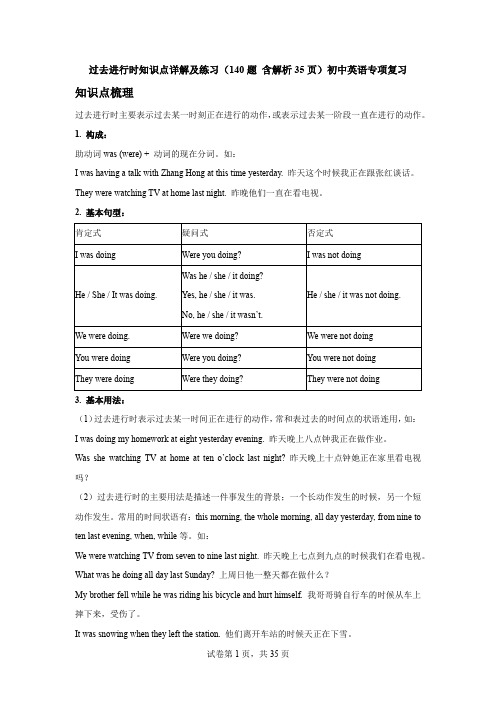
过去进行时知识点详解及练习(140题含解析35页)初中英语专项复习知识点梳理过去进行时主要表示过去某一时刻正在进行的动作,或表示过去某一阶段一直在进行的动作。
1. 构成:助动词was (were) + 动词的现在分词。
如:I was having a talk with Zhang Hong at this time yesterday. 昨天这个时候我正在跟张红谈话。
They were watching TV at home last night. 昨晚他们一直在看电视。
2. 基本句型:3. 基本用法:(1)过去进行时表示过去某一时间正在进行的动作,常和表过去的时间点的状语连用,如:I was doing my homework at eight yesterday evening. 昨天晚上八点钟我正在做作业。
Was she watching TV at home at ten o’clock last night? 昨天晚上十点钟她正在家里看电视吗?(2)过去进行时的主要用法是描述一件事发生的背景;一个长动作发生的时候,另一个短动作发生。
常用的时间状语有:this morning, the whole morning, all day yesterday, from nine to ten last evening, when, while等。
如:We were watching TV from seven to nine last night. 昨天晚上七点到九点的时候我们在看电视。
What was he doing all day last Sunday? 上周日他一整天都在做什么?My brother fell while he was riding his bicycle and hurt himself. 我哥哥骑自行车的时候从车上摔下来,受伤了。
It was snowing when they left the station. 他们离开车站的时候天正在下雪。
过去进行时讲解及练习题

过去进行时1.概念:表示过去某段时间或某一时刻正在发生或进行的行为或动作;2.时间状语:at this time yesterday, at that time或以when引导的谓语动词是一般过去时的时间状语等;yesterday ,last ,ago, before, in+年或月,on+日, just now或者a moment ago3.基本结构:was/were+doing4.否定形式:was/were + not + doing.5.一般疑问句:把was或were放于句首;主要表示在过去的某个时间点上正在发生、进行的动作;由于它的定义是表示在过去的某个时间点上正在发生、进行的动作,所以,句子常带有一个表示“过去某个时间点”的状语;这个状语可能是短语,词组,或是一个从句;也可能是通过上下文来表达这层意思;过去进行时主要用于下面的情景中:1表示在过去某时刻正在进行的动作,例如:At this moment yesterday, I was packing for camp.昨天这个时候,我正在收拾东西去露营;When I came to see her last time, she was writing an article.上次我来看她的时候,她正在写一篇文章;What were you doing at eight last night 昨晚八点钟你在做什么2用于故事的开头,交代故事发生的背景情况;过去进行时所描述的动作是“正在进行”,所以,在这种情景中用“过去进行时”可以给读者一种“动感”,从而能使文章更加生动活泼;例如:One night, he was typing in his study . Suddenly , a man broke into his house and cut off the electricity … .一天晚上,他正在书房里打字;突然,一个人闯进屋来,切断了电源……3仅限少数动词表示在过去的未来时间要发生的动作;例如:When National Day was coming near , they began to make a plan for the holiday .国庆节即将来临的时候,他们开始制订度假计划;She told me that she was going to Hainan for her holiday. 她告诉我她将去海南度假;My friend said to me that he was lunching with one of his customers that day .我朋友对我说,他今天要与他的一位客户一块儿吃午饭;We left there when it's getting dark. 天快黑的时候,我们离开了那儿;6.用过去进行时表示现在,主要是为了使语气委婉、客气;如:I was wondering if you could give me a lift. 我不知你能否让我搭一下车;We were hoping you would stay with us. 我们很希望你能跟我们住在一起;How much did you want to spend, sir 先生,您打算花多少钱注:一般过去时也有类似用法,但比较而言,用过去进行时显得更客气,更不肯定;过去进行时练习题一、用动词的适当形式填空1. While we __________ wait for the bus, a girl __________ run up to us.2. I __________ telephone a friend when Bob __________ come in.3. Jim __________ jump on the bus as it __________ move away.4. We __________ test the new machine when the electricity ________go off.5. She _____ not want to stay in bed while the others _____ all, work in the fields.6. While mother ________ put Cathy to bed, the door bell ________ ring.7. As I __________ walk in the park, it __________ begin to rain.8. Even when she ___________ be a child she ________________ already, think of becoming a ballerina 芭蕾舞演员.9. It was quite late at night. George __________ read and Amy __________ ply her needle when they __________ hear a knock at the door.10. There __________ be a group round the fire when they __________ reach it. An old woman __________ sit on the ground near the kettle; two small children __________ lie near her; a donkey __________ bend his head overa tall girl.11. I _____ have my breakfast at half past six yesterday morning.12. Mary _____ go over her lessons from six to seven last night. John and peter ____do the same thing.13. What _____ you ___ do at that time We _____ watch TV.14. Was your father at home yesterday evening Yes ,he was. He _____ listen to the radio.15. They _____not make a model ship when I saw him.16. _____ they ____ have a meeting at 4 yesterday afternoonNo, they _____. They _____ clean the classroom.17. ______ it ______rain when you left school Yes, it ____. No, it ____18. What _____ your father _____ do when he was your age19. One day, Edison _____ wait for a train to arrive, and suddenly a little boy ran to the track轨道 to play.20. He asked me if I ______ go fishing that afternoon.21. The three of them were in a hurry because their plane _____ leave in five minutes.22. In a letter, john told us that he _____ come to china next month.23. When the bell rang, jenny _____ wait in her seat.24. She _____ make her dress the whole afternoon.25. While my father ____ look through the evening paper, he suddenly ____ a cry.26. When I ____ come in the room, he ____ see me, for he ____ read something27. When we _____ arrive at the village, it _____ get dark and it _____ rain hard.28. I _____ know you ____wait for me here.29. One day a little monkey ____play in a tall tree. A mother crocodile 鳄鱼 ____ look for food near the bank.30. What ____ your father ____ do yesterday evening He ____ study at the evening school.31. Later his parents found that he _____ sit on some eggs.32. When he knocked at the door, my aunt ____ cook33. The students ______ sing and ____ dance happily on the playground at that time.34. I ____ write a letter when the door bell rang.35. We had no classed at that time. We ____ plant trees.二、选择题1.I ______ cooked a meal when you _____ me.a. cooked, were ringingb. was cooking, rangc. was cooking, were ringingd. cooked, rang2.He said he _____ to draw a plane on the blackboard at that time.a. triesb. triedc. was tryingd. will try3.While she ______ TV, she ______ a sound outside the room.a. was watching, was hearingb. watched, was hearingc. watched, heardd. was watching, heard4.They _____ a football game from 7 to 9 last night.a. were watchingb. watchc. watchedd. are watching5.What book ____ you ______ when I ____ you at four yesterday afternoona. did, read, was seeingb. did, read, sawc. were, reading, sawd. were, reading, was seeing6.It was Friday evening. Mr and Mrs. Green _____ ready to fly to England.a. are gettingb. getc. were gettingd. got7.Lei Feng _____ always _____ of others when he ______ in the army.a. is, thinking, wasb. was, thinking, isc. did, think, isd. was, thinking, was8.A girl ______ my pen fall off the table when she _____ me. a. saw, passed b. was seeing, passed c. was seeing, passed d. was seeing, was passing9.We ____ for tom at ten last Sunday. He often kept us ______.a. were waiting, waitingb. were waiting, waitc. waited, waitingd. waited, wait10.He ____ his father on the farm the whole afternoon last Saturday.a. helpsb. would helpc. was helpingd. ishelping11.While mother _______ some washing, I _____ a kite for Kate.a. did, madeb. was doing, madec. was doing, was makingd. did,was making12."_______ you angry then " "they ______ too much noise."a. are, were makingb. were, were makingc. are, maded. were,made13.He ____ some cooking at that time, so _____ mea. did, heardb. did, didn't hearc. was doing, heardd. was doing,didn't hear14.This time yesterday jack _____ his bike. He _____ TVa. repaired, didn't watchb. was repairing, watchedc. repaired, watchedd. was repairing, wasn't watching15.His parents wanted to know how he _____ on with his new classmates.a. was gettingb. getsc. is gettingd. will get练习㈠用所给动词的正确形式填空;1.Jim _____write a letter at that moment.2.When the telephone _______ring,she ______do her homework.3.When I ______leave the part,the people ______enjoy themselves.4.______ they______ feed the animals at 5:00 yesterday afternoon5. Mrs.Green _____ _____ not wash clothes at this time yesterday.6. Grandpa ______ ______ mend his clock when I reached home.7.As I _____ walk in the park, I saw some children playing games.㈡、单选1 What ______ from three to four yesterday afternoonA have you doneB had you doneC did you doD were you doing2 – I call you yesterday evening, but there was no answer.- Oh., I’m sorry I _____ dinner at my friend’s home.A homeB hadC was havingD have had3 My mother _____ while my father _____TV.A cooked; was watchingB was cooking; was watchingC was cooked; watchedD cooked; watched4 When I got home, my son _____ the music.A am listening toB listened toC was listening toD was listening5 We heard a cry when we ______ TV last night.A were watchingB would watchC watchD watched6 Could you tell me when ______A she is comingB she was comingC will be comeD is he coming7 The teacher ______ when I came into the classroom.A is drawingB drawsC has drawnD was drawing8 Nobody noticed what she ______ at the moment.A will doB was doingC has doneD had done9 Was it raining hard when you _____ this morningA l过去进行时练习一、用动词的适当形式填空;1.I ___________ have my breakfast at half past six yesterday morning.2.Mary _____________ go over her lessons from six to seven last night. John andPeter _____________do the same thing.3.What _____ you _______ do at that time We __________ watch TV.4.Was your father at home yesterday evening Yes,he was. He _______ listen to theradio.5.They _____not make a model ship when I saw him.6.______ it _________rain when you left school Yes, it ____. No, it ____7.What _____ your father _____ do when he was your age8.One day, Edison __________ wait for a train to arrive, and suddenly a littleboy ran to the track轨道 to play.9.The three of them were in a hurry because their plane __________ leave in fiveminutes.10.She __________ make her dress the whole afternoon.11.While we _____________ wait for the bus, a girl __________ run up to us.12.I _____________ telephone a friend when Bob __________ come in.13.Jim __________ jump on the bus as it __________ move away.14.We __________ test the new machine when the electricity __________ go off.15.She __________ not want to stay in bed while the others ________________ all,work in the fields.二、选择题1. I ______ a meal when you _____ me.A. cooked, were ringingB. was cooking, rangC. was cooking, were ringingD. cooked, rang2. He said he _____ to draw a plane on the blackboard at that time.A. triesB. triedC. was tryingD. will try3. While she ______ TV, she ______ a sound outside the room.A. was watching, was hearingB. watched, was hearingC. watched, heardD. was watching, heard4. They _____ a football game from 7 to 9 last night.A. were watchingB. watchC. watchedD. are watching5. What book ____ you ______ when I ____ you at four yesterday afternoonA. did, read, was seeingB. did, read, sawC. were, reading, sawD. were, reading, was seeing6. It was Friday evening. Mr and Mrs. Green _____ ready to fly to England.A. are gettingB. getC. were gettingD. got7. Lei Feng _____ always _____ of others when he ______ in the army.A. is, thinking, wasB. was, thinking, isC. did, think, isD. was, thinking, was8. A girl ______ my pen fall off the table when she _____ me.A. saw, passedB. was seeing, passedC. was seeing, pastD. was seeing, was passing9. We ____ for Tom at ten last Sunday. He often kept us ______.A. were waiting, waitingB. were waiting, waitC. waited, waitingD. waited, wait10. He ____ his father on the farm the whole afternoon last Saturday.A. helpsB. would helpC. was helpingD. is helping11. While mother _______ some washing, I _____ a kite for Kate.A. did, madeB. was doing, madeC. was doing, was makingD. did, was making12. “_______ you angry then ” “T hey ______ too much noise.”A. Are, were makingB. Were, were makingC. Are, madeD. Were, made13. He ____ some cooking at that time, so he _____ me.A. did, heardB. did, didn’t hearC. was doing, heardD. was doing, didn’t hear14. This time yesterday Jack _____ his bike. He _____ TVA. repaired, didn’t watchB. was repairing, watchedC. repaired, watchedD. was repairing, wasn’t watching15. His parents wanted to know how he _____ on with his new classmates.A. was gettingB. getsC. is gettingD. will get过去时中考真题Part 11. —What were you doing this time yesterday—I ____ on the grass and drawing a picture.A. sitB. satC. am sittingD. was sitting2. While I ___________ TV, the bell rang.A. watchB. watchedC. am watchingD. was watching3. —Why didn’t you answer my telephone yesterday—Sorry. I _______ a bath.A. tookB. takeC. am takingD. was taking4. While the alien _______ a souvenir, the girl called the police.A. was buyingB. boughtC. buysD. is buying5. —I called you at 6 o'clock yesterday evening, but nobody answered.—I'm sorry. I my friend download the movie Kung Fu Panda Ⅱwhen the telephone rang,A. would helpB. helpedC. was helping6. I along the road when I saw Peter. So we stopped and had a chat.A. walkedB. was walkingC. would walkD. had walked7. —What did the teacher say just now—Sorry. I didn’t catch it. I ____ something else.A. thinkB. will thinkC. was thinkingD. had thought8. When I came back yesterday evening, my brother ________ his homework.A is doing B. has done C. was doing9.Mrs White _____dinner when her son came home.A. is cookingB. was cookingC. are cookingD. were cooking10. —Did you see Mr. Black just now—Yes. He ______ his car when I met him.A. parkedB. was parkingC. parksD. will park11. — Amy, I called you yesterday evening, but nobody answered the phone.— Oh, I _________ a walk with my mother at that time.A. takeB. tookC. am takingD. was taking12.Yesterday evening, I ___along the street when I suddenly met my maths teacher.A. walkB. walkedC. was walkingD. am walking13.— Where were you at 7:00 last night— I _____ to my mom at home.A. writeB. was writingC. wrote14. —Why didn’t you go to play football with us yesterday afternoon—I _____my mother with the housework then.A. helpedB. was helpingC. had helpedD. have been helping15. He ____when the UFO arrived. He didn’t wake until the UFO disappeared.A. sleptB. was sleepingC. was doing homeworkD. was singing16. I_______ my homework at nine o'clock last Sunday morning.A. am doingB. was doingC. do17. I was very angry with John—he just_______ when I spoke to him.A. isn’t listeningB. hasn’t listenedC. didn’t listenD. wasn’t listening18. —I called you at 4:00 yesterday afternoon, but no one answered.—Sorry, I _____ with my friends at that time.A. swimB. swamC. will swimD. was swimming19. Mr. Li _____ us a report on our environment when the earthquake happened in Japan.A. gaveB.is givingC.was giving20. — Mr. Lee ______ to a student when I entered the classroom this morning.- He is very patient ______ he is young.A. talking; butB. talks; thoughC. was talking, thoughD. talked, however21.—Were you at school when he came to see you—Yes, I ______ a math class.A. hadB. was havingC. am havingD. have22. I met a good friend of mine while I on the street.A. walksB. walkC. was walkingD. am walking23. I ________ when the UFO landed.A. am watching TVB. was watching TVC. have watched TVD. watched TV24. The girl with two cats in the yard when the earthquake happened.A. was playingB. is playingC. are playingD. were playingPart 21. Paul and I ____ tennis yesterday. He did much better than 1.A. playB. will playC. playedD. are playing2. A big party was held in NO.18 Middle School last night, the teacher with students_____singing and dancing happily at the party.A. isB. wasC. areD. were3. Mr. Black is going to marry a girl he _______ in Japan last year.A. meetsB. metC. has metD. would meet4. He went into his room, the light and began to work.A. has turned onB. turned offC. turned onD. has turned off5.—What did Mr. Smith do before he came to China—He in a car factory.A. worked B.works C.is working D.will work6. —Have you ever been to Hong Kong—Yes, I ___ there last month.A. went toB. have beenC. went7. This morning I had hardly got to my school when it_____ to rain.A. had begunB. was beginningC. beganD. begins8.—You have found your lost umbrella, haven’t you—Yes. I _____ it behind the door this afternoon.A. have foundB. will findC. found9. Tom, along with three other boys, _______ seen playing football a moment ago.A. isB. wasC. areD. were10. Ten minutes ago, there______ an eraser, a pen and some books on the desk.A. wasB. wereC. is11. — How was your trip to Hang Zhou, Jim—Great We ___ to Xixi National Wetland Park.A. goB. am goingC. will goD. went12. – Do you know who cleaned the blackboard, Tina-- Yes. John _____.A. doB. doesC. did13. The last time I ______ to the cinema was two years ago.A. goB. have goneC. have beenD. went14. — Have you ever been to Canada—Yes, I there last year with my parents.A. have beenB. have goneC. wentD. go15. I called you, but nobody answered. Where _______ youA. isB. areC. wasD. were16. ---Have you ever been to Shanghai---Yes. I _____ there a few months ago.A have been B. went C. have gone17. What’s the best present you have ever ________A. receivedB. receivesC. receiving18.—Lin Kai, hand in your homework, please.—Oh, sorry. I ______ it at home this morning.A. was leavingB. has leftC. will leaveD. left19. I'm now in New York with my friend Jenny. We_____ by plane on Monday.A.arriveB. arrivedC. are arrivingD. will arrive20.—Guess What The great movie is on in the cinema.一Nothing new.I_________ it with my parents on the first day.A. saw B.see C.will see D. have been21. If it had been fine yesterday, we could have watched that air show. But it____ all day.A. has rainedB. had rainedC. rainedD. rains22. –When _______ your mother _______ you that blue dress, Lucy–Sorry, I really can’t remember. Maybe two or three weeks ago.A. will; buyB. does; buyC. did; buy23. -I’ve got a ticket for the basketball game tonight.-CoolHow you itA. had, gotB. did, getC. were, gettingD. will, get24. Hello I'm very glad to see you. When________ you_________ hereA. did; arriveB. will; arriveC. have; arrivedD. are; arriving25. —I have to be off right now.—What a pity I you could stay a little longer with us.A. thinkB. am thinkingC. thought26. Tom was so careless that he __ his right arm when he was riding to school.A. hurtsB. hurtC. has hurtD. had hurt27. —I ______ something wrong just now. May 1 use your eraser—Of course. Here you are.A. writeB. wroteC. am writing。
(英语)高中英语过去进行时练习题含解析

--Yeah, he ______ himself in Australia.
A.is enjoyingB.was enjoying
【答案】D
【解析】
本题考察的是进行时表示将来时的用法。句义:她告诉我她会邮寄部分产品,剩下的几天以后再邮寄。本句中使用的是过去进行时表示过去将来时,表示计划好的要发生的事情。故D正确。
7.I would have attended your birthday party last night but for the fact that itat that time.
A.haven’t listenedB.weren’t listening
C.don’t listenD.hadn’t listened
【答案】B
【解析】
试题分析:句意:--你刚才说什么了?对不起,怀特太太,可是…,--那么你没有听我说话,皮特。从What did you say?可知是过去没有再听,属于过去范畴的时态,排除AC,D项是过去完成时,是过去的过去的动作,这里显然不是,而是表示过去正在做…,选B。
B.intended;had rained
C.have intended;rained
D.had intended;was raining
【答案】D
【解析】
第一空表示“本打算做而事实上没做”应用had intended to do或intended to have done;第二空表示过去的一个事实,当时正在下倾盆大雨,应用过去进行时,故D项正确。
(英语)过去进行时练习及解析
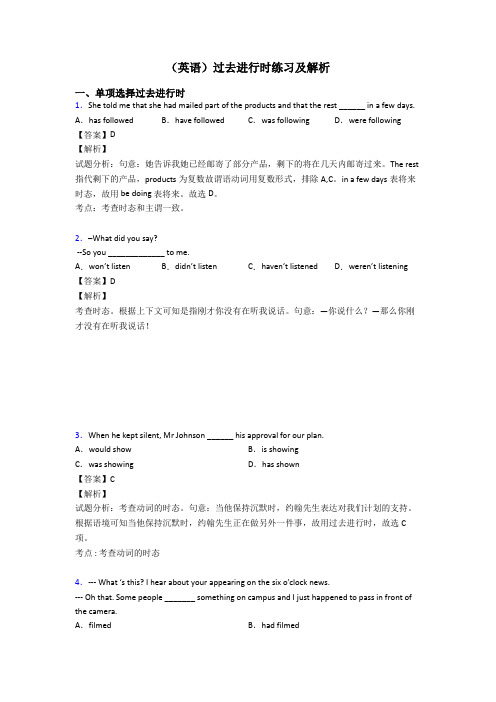
(英语)过去进行时练习及解析一、单项选择过去进行时1.She told me that she had mailed part of the products and that the rest ______ in a few days. A.has followed B.have followed C.was following D.were following 【答案】D【解析】试题分析:句意:她告诉我她已经邮寄了部分产品,剩下的将在几天内邮寄过来。
The rest 指代剩下的产品,products为复数故谓语动词用复数形式,排除A,C。
in a few days表将来时态,故用 be doing 表将来。
故选D。
考点:考查时态和主谓一致。
2.–What did you say?--So you _____________ to me.A.won’t listen B.didn’t listen C.haven’t listened D.weren’t listening 【答案】D【解析】考查时态。
根据上下文可知是指刚才你没有在听我说话。
句意:—你说什么?—那么你刚才没有在听我说话!3.When he kept silent, Mr Johnson ______ his approval for our plan.A.would show B.is showingC.was showing D.has shown【答案】C【解析】试题分析:考查动词的时态。
句意:当他保持沉默时,约翰先生表达对我们计划的支持。
根据语境可知当他保持沉默时,约翰先生正在做另外一件事,故用过去进行时,故选C 项。
考点 : 考查动词的时态4.--- What ‘s this? I hear about your appearing on the six o’clock news.--- Oh that. Some people _______ something on campus and I just happened to pass in front of the camera.A.filmed B.had filmedC.were filming D.have been filming【答案】C【解析】试题分析:考查动词。
【英语】过去进行时练习题含答案及解析

-Yes, he ________, and he looked a little bit nervous.
A.had interviewed B.was interviewed
C.was being interviewed D.is being interviewing
— I have no idea;he__it this morning.
A.was doingB.had been doingC.has doneD.did
【答案】A
【解析】
题干没有构成“过去的过去”,不可选B。如选C、D则表示动作已完成,与have no idea相矛盾。过去进行时表示过去某段时间或某一时刻正在进行的动作,不涉及结果,正好附合题干语境。
8.She told me that she had mailed part of the products and that the rest ______ in a few days.
A.has followedB.have followedC.was followingD.were following
—I had just finished my homework and ________to take a shower.
A.dropping;start
B.had dropped;started
C.dropped;have started
D.dropped;was starting
【答案】D
【解析】
C.had metD.has met
【答案】B
【解析】
初中英语过去进行时专项语法讲解及练习题
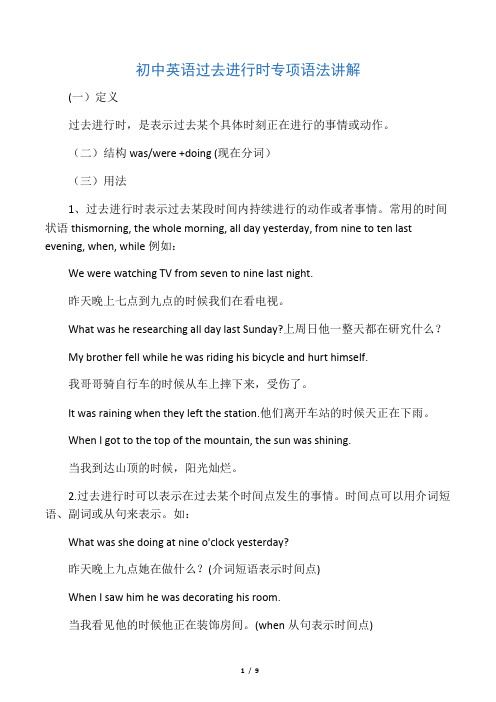
初中英语过去进行时专项语法讲解(一)定义过去进行时,是表示过去某个具体时刻正在进行的事情或动作。
(二)结构was/were +doing (现在分词)(三)用法1、过去进行时表示过去某段时间内持续进行的动作或者事情。
常用的时间状语thismorning, the whole morning, all day yesterday, from nine to ten last evening, when, while例如:We were watching TV from seven to nine last night.昨天晚上七点到九点的时候我们在看电视。
What was he researching all day last Sunday?上周日他一整天都在研究什么?My brother fell while he was riding his bicycle and hurt himself.我哥哥骑自行车的时候从车上摔下来,受伤了。
It was raining when they left the station.他们离开车站的时候天正在下雨。
When I got to the top of the mountain, the sun was shining.当我到达山顶的时候,阳光灿烂。
2.过去进行时可以表示在过去某个时间点发生的事情。
时间点可以用介词短语、副词或从句来表示。
如:What was she doing at nine o'clock yesterday?昨天晚上九点她在做什么?(介词短语表示时间点)When I saw him he was decorating his room.当我看见他的时候他正在装饰房间。
(when从句表示时间点)3.在复合句中,如果主要动作和背景动作都是延续的或同时发生的,那么主从句的动词都可用过去进行时。
例如:While he was waiting for the bus, he was reading a newspaper.他边等车边看报。
高中英语过去进行时解题技巧讲解及练习题(含答案)

A.don’t seeB.hadn’t seen
C.am not seeingD.wasn’t seeing
【答案】D
【解析】
试题分析:句意:那个撞倒我的陌生人说:“非常抱歉。我刚才没有看到你。”根据上下文句意可知,动作发生在过去,需要用过去时,B项是过去完成时,表示过去的过去,而句中没有体现过去的过去语境,所以排除B,有句意可知,现在看到了,所以排除A、C。故选D。
A.practisedB.was practising
C.am practisingD.have practiced
【答案】B
【解析】
B考察时态。句义:—怎么回事?你刚才没有接电话。—对不起,我刚才正在随着音乐练习舞蹈,现在不是接了电话吗?由句义可知,选过去进行时。
2.––Have you asked Peter for advice?考点:考查动 Nhomakorabea时态的用法。
8.(湖南省怀化市2014年高三第二次模拟考试)33. She told me that she had mailed part of the products and that the rest ______ in a few days.
A.has followedB.have followedC.was followingD.were following
— No, I _______my mother do housework all day.
A.was helpingB.would helpC.had helpedD.help
过去进行时的讲解以及练习
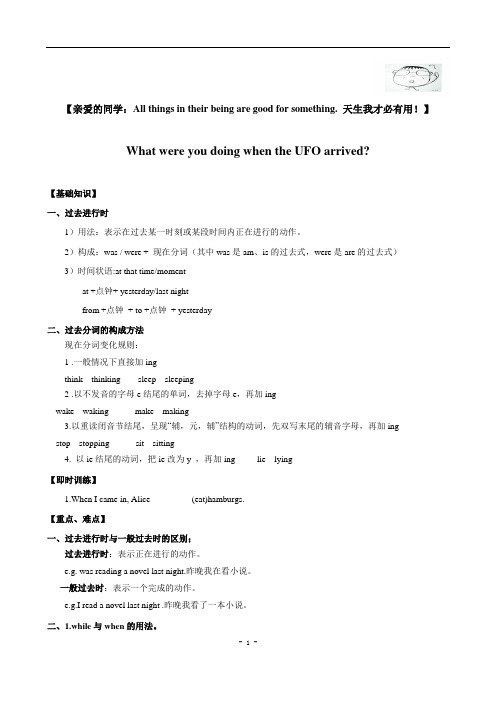
【亲爱的同学:All things in their being are good for something. 天生我才必有用!】What were you doing when the UFO arrived?【基础知识】一、过去进行时1)用法:表示在过去某一时刻或某段时间内正在进行的动作。
2)构成:was / were + 现在分词(其中was是am、is的过去式,were是are的过去式)3)时间状语:at that time/momentat +点钟+ yesterday/last nightfrom +点钟+ to +点钟+ yesterday二、过去分词的构成方法现在分词变化规则:1 .一般情况下直接加ingthink---thinking sleep---sleeping2 .以不发音的字母e结尾的单词,去掉字母e,再加ingwake---waking make---making3.以重读闭音节结尾,呈现“辅,元,辅”结构的动词,先双写末尾的辅音字母,再加ingstop---stopping sit---sitting4. 以ie结尾的动词,把ie改为y ,再加ing lie---lying【即时训练】1.When I came in, Alice _________(eat)hamburgs.【重点、难点】一、过去进行时与一般过去时的区别;过去进行时:表示正在进行的动作。
e.g. was reading a novel last night.昨晚我在看小说。
一般过去时:表示一个完成的动作。
e.g.I read a novel last night .昨晚我看了一本小说。
二、1.while与when的用法。
when可指时间点,又可指时间段,从句中可用延续性动词,也可用非延续性动词。
while总是指一个时间段,从句中必须用延续性动词。
1)延续性动词指动作可以延续一段时间,而不是瞬间结束。
(英语)英语过去进行时练习题含答案含解析
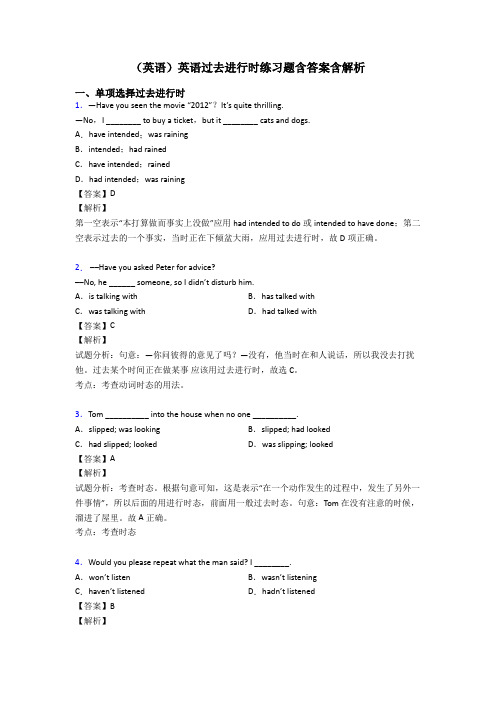
【解析】
B考察时态。句义:—怎么回事?你刚才没有接电话。—对不起,我刚才正在随着音乐练习舞蹈,现在不是接了电话吗?由句义可知,选过去进行时。
13.—David, are you listening to me?
—Sorry, Dad. I ________ to make sense of what the reporter said.
A.tryB.triedC.am tryingD.was trying
【答案】D
【解析】
试题分析:考查情景交际和时态。句意:--噢!你撞到我了!--对不起。我(刚才)正在赶公交车。根据情景可知,是刚才发生的事情,应该用过去的某种时态,强调过去某一时刻发生的事情,用过去进行时,故选D。
考点:考查情景交际和时态
16.–Why do you know so much detail about the accident?
--I ________ a walk nearby when it happened.
A.hadB.had hadC.was havingD.would have
【答案】C
【解析】
试题分析:考查时态。根据句意“当事故发生的时候,我正在附近散步”可知用过去进行时,表示过去正在发生的事情。句意:——你为什么知道这么多这起事故的细节?——当事故发生的时候,我正在附近散步。故C正确。
A.filmedB.had filmed
C.were filmingD.have been filming
【答案】C
【解析】
试题分析:考查动词。句意:怎么?我听说你出现在了6点钟的新闻里面。哦,那个啊!正好那时候有人在学校里拍东西,我恰巧路过了镜头。那个时候正在做某事,用过去进行时,故选C项。
- 1、下载文档前请自行甄别文档内容的完整性,平台不提供额外的编辑、内容补充、找答案等附加服务。
- 2、"仅部分预览"的文档,不可在线预览部分如存在完整性等问题,可反馈申请退款(可完整预览的文档不适用该条件!)。
- 3、如文档侵犯您的权益,请联系客服反馈,我们会尽快为您处理(人工客服工作时间:9:00-18:30)。
过去进行时过去进行时态表示的是过去某个时间正在进行或发生的动作。
其构成形式为:“主语+was/were+现在分词”构成。
一般情况下,过去进行时态有一些提示性词语,如at this time yesterday, at that time,this morning,from nine to ten , at that moment, at this time yesterday, at eight last night. when, while 引导的时间状语从句,有时没有这些时间状语,则要通过上下文的联系来表示。
过去进行时态用法简单列举如下:1. 肯定句式。
过去进行时态的肯定句式一般体现为:“主语+was/were+现在分词+其他”构成。
其中凡是在主语是单数人称情况下一律用was,复数人称情况下用were。
如:I was working. We were working.2. 否定句式。
过去进行时态的否定句式构成形式为“主语+was/were+not+现在分词+其他”构成。
was/were的用法与肯定句式的用法相似。
如:I was not working. We were not working.3. 疑问句式。
过去进行时态的疑问句式只需把was/were提前放在句首即可。
其构成形式为“was/were +主语+not+现在分词+其他?”构成。
如;Was she working? Were they working?其简略回答形式用“Yes+主语+动词”或“No+主语+动词+not”。
如:Yes, she was.No, she was not.其中,过去进行时态的现在分词构成规则与现在进行时态的过去分词是相同的。
[用法]一、过去进行时的主要用法是描述一件事发生的背景;一个长动作发生的时候,另一个短动作发生。
常用的时间状语:this morning, the whole morning, all day yesterday, from nine to ten last evening, when, while We were watching TV from seven to nine last night.昨天晚上七点到九点的时候我们在看电视。
What was he researching all day last Sunday?上周日他一整天都在研究什么?My brother fell while he was riding his bicycle and hurt himself.我哥哥骑自行车的时候从车上摔下来,受伤了。
It was raining when they left the station.他们离开车站的时候天正在下雨。
When I got to the top of the mountain, the sun was shining.当我到达山顶的时候,阳光灿烂。
二、过去进行时可以表示在过去某个时间点发生的事情。
时间点可以用介词短语、副词或从句来表示。
What was she doing at nine o’clock yesterday?昨天晚上九点她在做什么?(介词短语表示时间点)When I saw him he was decorating his room.当我看见他的时候他正在装饰房间。
(when从句表示时间点)三、在复合句中,如果主要动作和背景动作都是延续的或同时发生的,那么主从句的动词都可用过去进行时。
例如:While he was waiting for the bus, he was reading a newspaper.他边等车边看报。
(两个动作都是延续的)He was cleaning his car while I was cooking.他擦车时我在做饭。
(两个动作同时进行)四、通常不能用于过去进行时的动词主要有:agree, be, believe, belong, care, forget, hate, have(拥有), hear, know, like, love, mean, mind, notice, own, remember, seem, suppose, understand, want, wish等。
例如:误:I was knowing the answer.正:I knew the answer. 我知道答案。
误:I wasn’t understanding him.正:I didn’t understand him. 我不明白他的意思。
五.过去进行时中有always, forever, continually, constantly修饰时,表示说话人的赞赏或厌烦的感情。
:He was always thinking of others. 他总是想到人家。
She was always thinking of others. 她老是想到别人。
(赞扬)She was forever complaining. 她老是抱怨。
(厌烦)六.表示过去将来,多用于go, come, leave, start, take off等动词。
如:He said he was leaving for home in a day or two. 他说他一两天之内就动身回家了。
★与一般过去时的区别:一般过去时表示过去时间里做了某事,侧重动作的结束。
过去进行时表示动作在过去时间里正在进行,侧重动作的延续性。
如:We planted trees yesterday.昨天我们栽了树。
We were planting trees at nine yesterday.昨天九点我们在植树。
一、仿照例句用所给的词汇造句。
1. I, see him, he, cross the streetI saw him while he was crossing the street.(He was crossing the street when I saw him.)A. the sun, shine, we, come outB. she, study at college, before the war, break out2. I, do my homework, last nightI was doing my homework last night.A. they, have a dress rehearsal, yesterday eveningB. my grandma, visit my family, half an hour ago3. she, not at home that evening, she, look after her sick child in hospitalShe wasn’t at home tha t evening. She was looking after her sick child in hospital.A. it, rather chilly yesterday, the sun, not shineB. she, ill that day, she, suffer from a severe headache二、用动词的适当形式填空。
1. While we __________(wait)for the bus, a girl __________(run)up to us.2. I __________(telephone)a friend when Bob __________(come)in.3. Jim __________(jump)on the bus as it __________(move)away.4. We __________(test)the new machine when the electricity __________(go)off.5. She __________(not want)to stay in bed while the others ________________(all, work)in the fields.6. While mother ________(put)Cathy to bed, the door bell ________(ring).7. As I __________(walk)in the park, it __________(begin)to rain.8. Even when she ___________(be)a child she ________________(already, think)of becoming a ballerina (芭蕾舞演员).9. It was quite late at night. George __________(read)and Amy __________(ply)her needle when they __________(hear)a knock at the door.10. There __________(be)a group round the fire when they __________(reach)it. An old woman __________(sit)on the ground near the kettle; two small children __________(lie)near her; a donkey __________(bend)his head over a tall girl.。
